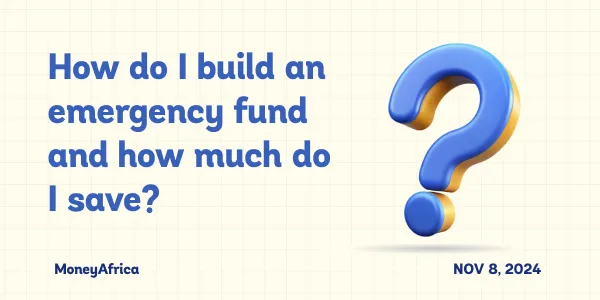Emergencies are a matter of “when,” not “if.” In Nigeria, where many people face inflation and job insecurity, it is critical to be financially prepared for life’s unexpected events. An emergency fund does more than just provide peace of mind but also shields from financial shocks and crippling debt taken out of desperation.
Imagine the peace of mind that comes with knowing you are prepared for life’s unexpected twists. A sudden laptop failure or urgent medical bill for a loved one no longer spells financial disaster. If your job situation changes, you will have a financial cushion to fall back on while transitioning to a new opportunity.
How Much Should You Save?
The general advice is to aim for three to six months of living expenses. Calculate your essential monthly costs in terms of rent, food, utilities, transport, and any necessary debt payments. Multiply that by three or by six to get your target emergency fund amount.
You can take our survey that helps you to estimate how much you need for your emergency fund, but here’s also a simple breakdown:
1. Calculate your monthly essentials: If you spend ₦100,000 on necessary expenses each month, your target emergency fund should be between ₦300,000 and ₦600,000.
2. Start small: If three months’ worth of expenses seems daunting, begin with a goal to save just one month’s worth. Once you hit that, aim for two months, and so on.
While it may feel overwhelming to save this much, remember that every little bit counts. Small steps eventually lead to big results.
Practical Tips for Building Your Emergency Fund
1. Start with a Monthly Goal
Instead of looking at the final amount, break your savings goal into monthly amounts that are realistic for your budget. For example, if your target emergency fund is ₦300,000, aim to save ₦25,000 per month.
2. Create a Separate Savings Account
It is best to keep your emergency fund in a separate account from your everyday spending. This makes it easier to track and harder to dip into for non-emergencies. Look for a high-yield savings account with minimal withdrawal restrictions, so your money can grow while it’s stored away. You can make use of fintech apps like Ladda.
3. Automate Your Savings
Set up an automatic transfer to your emergency fund account every payday. By automating the process, you won’t be tempted to skip saving, and it will soon become a habit.
4. Cut Back on Non-Essential Spending
Take a good look at your budget to track expenses you can trim. Perhaps it’s reducing takeout meals or skipping some weekend hangouts. Every little bit you save can go into your emergency fund, helping you reach your goal faster.
5. Track Your Progress
Stay motivated by tracking your savings progress. There are several free budgeting apps that can help you monitor your goals. Seeing your emergency fund grow, even if it is gradual, can be a rewarding experience.
It is also important to know that not every financial bump is an emergency. A sale at your favourite store or a new phone release isn’t an emergency—it’s a want, not a need. An emergency fund is meant for unexpected and necessary expenses.
An emergency fund is a great starting point, but it is not the only aspect of financial security. Once you have built your rainy day fund, consider focusing on other financial goals, like investing, saving for retirement, and developing a budget that prioritises your financial future.
And don’t forget—financial planning is a journey. It’s okay to start small. The important thing is consistency and discipline.
***
Do you know that we have our own podcast? It’s MONEYTALKS!💚
Here’s a link to listen to all the amazing episodes we have!
***
Thank you for reading Money Africa’s Blog.
Please feel free to share it.
Do you have any questions? You can send an e-mail to info@themoneyafrica.com or send a DM to any of our social media channels.
***
MoneyAfrica premium plan
Are you a mid to high-income earner? Do you find communities a bit too busy? You should sign up for our premium plan.

You can learn more about that here.
***
We often get questions regarding how to plan your finances to align with your relocation plans, especially for students seeking to further their studies. As always, we have heard you, and we have put together an e-book to help you navigate this. Follow this link, to get your FREE copy of the e-book: The Japa Encyclopedia.
***
Get our annual subscription and learn more about investing safely and building a solid portfolio in 2024.
Don’t forget to:
- Join our community, if you want to smash your 2024 financial goals. It takes at least 30 days to build great habits that will last you a lifetime. So why not start now? There is a lot you can achieve.
- If you would like to document your financial journey in 2024, then our journal would be an excellent fit for you. It costs ₦7,500 (excluding delivery).
- Get a budget sheet to track your monthly expenses. Click here
- Get an investment tracker to be on top of all your investments. Click here
MoneyAfrica is a financial literacy platform. Our goal is to make everyone better with their finances.
We do this by engagements via our:
– social media handles
– platforms for paid community members (for adults and students)
– webinar sessions with corporate clients
Would you like to join any of the communities? Please click here
Would you like us to hold a webinar for your company’s staff? Please send an email to info@themoneyafrica.com


